Signs You May Have Liver Stress
By Dr. Vishesh Bharucha +2 more

Get,

to manage your symptom
Get your,


4 Cr+ families
benefitted

OTP sent to 9988776655



You’ve successfully subscribed to receive
doctor-approved tips on
Whatsapp

Get ready to feel your best.

Hi There,
Download the PharmEasy App now!!


Register to Avail the Offer
Send OTPBy continuing, you agree with our Privacy Policy and Terms and Conditions

Hi There,
Sign up on PharmEasy now!!
Trusted by 4 crore+ families

OTP sent to 9988776655



You have unlocked 25% off on medicines




Code: NU25

Comments


Leave your comment here
By Dr. Vishesh Bharucha +2 more
Table of Contents
The liver is one of the most hardworking but undervalued organs in the body. While much attention is given to heart health, weight loss, and glowing skin, it is the liver that performs approximately hundreds of essential functions. These include storing nutrients like sugar, minerals, and vitamins to fuel the body; controlling the production and excretion of cholesterol; producing bile, which is stored in the gallbladder and helps break down fats1; and filtering out harmful substances, such as alcohol, medicines, and environmental factors2.
Just like the heart, the liver can also be stressed; however, unlike heart problems that may show early signs, the symptoms of a distressed liver show up very late. The liver is stressed when it is overworked and becomes sluggish.
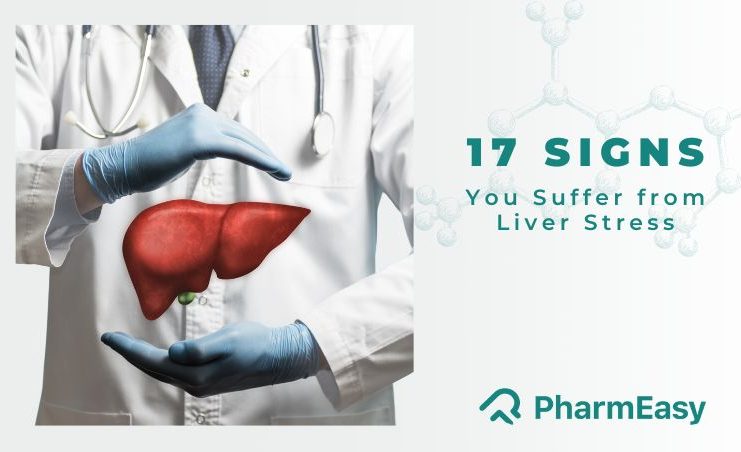
So, how do you understand if the liver is in distress? Here are 17 symptoms that may indicate your liver is under stress:
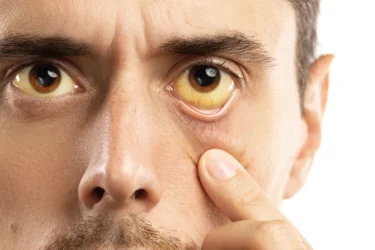
Skin discolouration may sometimes be linked to liver problems. If your skin colour changes to jaundice yellow or pale with a blue tinge, your nails or fingertips turn yellow, or you have yellowing of the eyes, it is advisable to visit a doctor. This change in colour occurs because the body is unable to flush out the toxins, which leads to bilirubin accumulating under the skin, causing skin discolouration3.

Feel bloated frequently and have constipation too? Frequent indigestion may be associated with liver issues. With bloating, you may experience stomach pain as well4. This happens because the bile is unable to break down the food during digestion.
Another important sign is Spider naevi. Spider naevi or angiomas are small clusters of blood vessels that form just beneath the skin, often spreading outward like a spider’s legs. Angiomas typically appear red or purple in colour. These are often present in excessive numbers in people with liver disease.
Dr. M.G. Kartheeka, MBBS, MD (Pediatrics)

The liver plays an essential role in filtering blood and supports the synthesis of many nutrients needed for good health. However, when the liver is stressed, it may affect the synthesis and delivery of nutrients to muscles, tissues and tendons. This may lead to symptoms such as muscle cramps, weakness, and fatigue5.

Do you feel tired all the time? Persistent fatigue may occur when the liver isn’t functioning efficiently. When the body is under continuous strain, it may place additional pressure on the liver and other organs, leading to persistent tiredness. It is best to get your liver checked at this point5.

Is your urine darker than usual? It is possible that this may be due to inadequate water intake, which may cause your stools to be darker too. If you start drinking enough water and the colour of your urine and stool lightens, all may be well. However, if your urine and stool colour are still dark, you should seek medical help as this may be caused by liver problems5.
The culture of fast foods these days is slowly damaging the liver due to non-alcoholic fatty liver disease. Avoiding refined sugar and fast foods and eating before dusk helps a lot in prevention of fat accumulation in the liver, which can allay liver stress symptoms (by promoting weight loss).
Dr. Nikhil Yadav, MBBS MD, CCEBDM

When the liver is stressed, some individuals may experience mood changes or emotional disturbances, such as irritability, anxiety, mood swings, and depression, and some may even experience cognitive impairment, meaning their memory, attention span, and decision-making may be affected6.

Another potential liver distress symptom is little-to-no interest in food. A reduced desire to eat is often caused by an underlying health issue and should be taken seriously5.

Although irregular sleep pattern is a common occurrence amongst millennials due to a stressed lifestyle, a study7 found that liver cirrhosis was responsible for unusual sleep patterns in many patients.

When you have liver problems, the liver may not be able to purify your blood adequately. When toxins are not removed from the blood, it may lead to symptoms like memory loss, difficulty thinking, and confusion5.

Abnormal skin itchiness may be a symptom of liver cirrhosis3.

Liver disease tends to develop over time, slowly replacing healthy liver tissue with scarred or damaged tissue. This affects liver function and changes the metabolism, hormonal balance, and many other factors, which may lead to weight gain8.
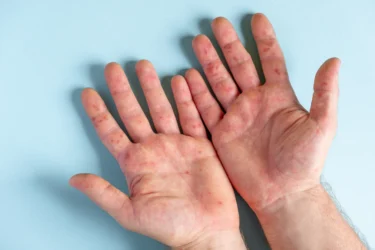
Experts believe that when you develop nonalcoholic fatty liver disease (liver disease not associated with alcohol), your palms start to turn reddish, an outward indicator of liver dysfunction3.
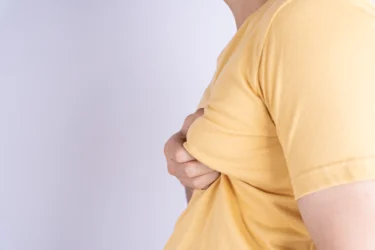
Another probable symptom of nonalcoholic fatty liver disease is the enlargement of breasts in men. Although the exact cause of this is unclear, it is speculated that this may occur due to excess production of the female hormone, oestrogen, in this condition9.

Liver damage also manifests in the form of easy and sudden skin bruises and even bleeding5.
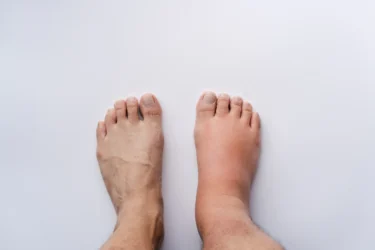
Swelling in the ankles and feet may also be associated with liver dysfunction. There may also be abdominal swelling due to the accumulation of fluid in the abdomen5.
Liver function tests are commonly recommended blood tests for measuring different enzymes, proteins and other substances made by the liver. Changes noticed in liver function tests should be reviewed by a physician to find the cause and manage the condition.
Dr. Ashish Bajaj, M.B.B.S., M.D., in Clinical Pharmacology and Toxicology
Also Read: Liver Fibrosis: What Is It, Causes, Symptoms & Treatment

Experiencing chills is often a natural response of the body when the mercury drops or when you are developing a fever. However, if none of this fits the bill, it could indicate cholestasis (blocked or reduced bile flow) associated with liver disease10.

When the liver is under stress, it can disrupt many bodily functions and may be associated with symptoms such as ringing in the ears, sleep disturbances, dizziness, blurry vision, allergic reactions, gastrointestinal bleeding, reduced sex drive, unexplained weight changes, sensitivity to chemicals, and the appearance of spider veins11,5.
Also Read: Natural Home Remedies for Fatty Liver
A healthy liver is important for overall well-being, as it supports many essential functions like the storage of nutrients, digestion, and filtering blood. If you are experiencing any of these symptoms mentioned in this article, it is advisable to consult your doctor or a liver specialist today to identify the cause of your symptoms and support the timely management of liver issues.
Also Read: What is Hepatitis A? Causes, Symptoms, and How It Spreads
Disclaimer: The information provided here is for educational/awareness purposes only and is not intended to be a substitute for medical treatment by a healthcare professional and should not be relied upon to diagnose or treat any medical condition. The reader should consult a registered medical practitioner to determine the appropriateness of the information and before consuming any medication. PharmEasy does not provide any guarantee or warranty (express or implied) regarding the accuracy, adequacy, completeness, legality, reliability or usefulness of the information; and disclaims any liability arising thereof.
Comments

Leave your comment...

View all comments(1)
You may also like
Thank you for your feedback, glad you liked it